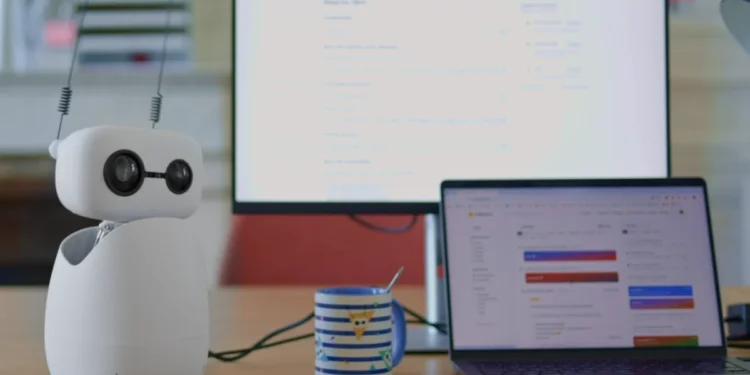Hugging Face just made AI robotics accessible to millions of developers, students, and coding enthusiasts with the launch of Reachy Mini, a desktop robot that costs less than most smartphones. The company opened pre-orders for two versions: a $299 lite model and a $449 wireless version that runs independently.
This puts Hugging Face in direct competition with established robotics companies by targeting everyday developers instead of research institutions. Both versions come as DIY kits that users assemble themselves, complete with expressive screen eyes, animated antennas, and full Python programming support.
Reachy Mini Brings Professional AI Models to Your Desk
What sets Reachy Mini apart from other educational robots is its deep integration with Hugging Face Hub. Users get instant access to over 1.7 million AI models and 400,000 datasets directly through the robot’s software platform.
The robot measures 11 inches tall and weighs just 3.3 pounds, making it perfect for desktop development. It features a motorized head with 6 degrees of freedom, full body rotation, and two animated antennas that respond to programming commands.
Both versions include wide-angle cameras, microphones, and speakers for multimodal AI interactions. The wireless version adds a Raspberry Pi 5 computer, WiFi connectivity, battery power, and an accelerometer for standalone operation.

Python Programming Makes Robot Development Simple
Reachy Mini uses the same Python SDK that powers larger Reachy robots, making it easy for developers to start coding immediately. The pure Python library works on any computer running Python 3.6 or later and installs through pip in seconds.
Developers can control the robot with just a few lines of code:
Copyfrom reachy_sdk import ReachySDK
reachy = ReachySDK(host='robot-ip-address')
The SDK provides real-time access to joint positions, camera feeds, and sensor data. It supports both joint and cartesian space movements, allowing developers to create complex behaviors without deep hardware knowledge.
Ready-to-Use Behaviors Show Instant Results
Reachy Mini ships with over 15 pre-installed behaviors that demonstrate its capabilities right out of the box. Users can immediately see animated facial expressions, antenna movements, basic object detection, and gesture responses without writing any code.
These behaviors serve as educational starting points for custom development. The robot can display emotions through screen expressions, motion patterns, and sound combinations that create engaging human-robot interactions.
The open-source design means developers can 3D-print replacement parts, modify hardware components, and share their creations with the global community. All CAD files will be released under CC BY-SA 4.0 license when the product ships.
Simulation Environment Lets You Code Before Hardware Arrives
Hugging Face provides a complete simulation SDK that lets developers write and test robot behaviors before their physical robot arrives. The simulation works with Gazebo and PyBullet environments, plus ROS 2 packages for advanced robotics development.
This simulation-first approach means developers can start building applications immediately after ordering, then seamlessly transfer their code to the physical robot when it ships. The same Python SDK controls both simulated and real robots.
Educational Market Gets Affordable AI Robotics Platform
The $299 starting price puts Reachy Mini well below most educational robotics platforms. Traditional programmable robots like Lego Mindstorms cost around $759, while professional desktop robotic arms start at several thousand dollars.
Reachy Mini targets coding bootcamps, computer science classrooms, and individual developers who want hands-on AI experience. The DIY assembly process teaches hardware basics while the Python SDK provides immediate programming gratification.
Schools can order multiple units for classroom use, with each robot supporting different student projects simultaneously. The Hugging Face Hub integration means students access the same AI models used in professional applications.
Delivery Timeline Splits Between Two Versions
The Lite version will be available starting late 2025, while the wireless model will roll out in phases from the end of 2025 into 2026. Both versions come as kits and will need to be assembled using the parts included.
Hugging Face describes this as an early development phase product shared with early adopters for feedback. The company provides no warranties or guarantees during this initial release period.
Pre-orders are available now through Stripe checkout, with additional taxes and shipping costs added at purchase. The company expects high demand based on early community response.
Competition Heats Up in Consumer AI Robotics
Reachy Mini enters a growing market of affordable AI robots targeting consumers and educators. Competitors include Miko’s AI-powered educational robots, various Arduino-based kits, and upcoming releases from established robotics companies.
The key differentiator is Hugging Face’s massive AI model ecosystem. While other robots require users to build AI capabilities from scratch, Reachy Mini provides immediate access to state-of-the-art speech recognition, computer vision, and natural language processing models.
This integration could accelerate AI robotics adoption by removing the biggest barrier for most developers: access to sophisticated AI models. Instead of spending months training custom models, developers can focus on creative applications and user experiences.














